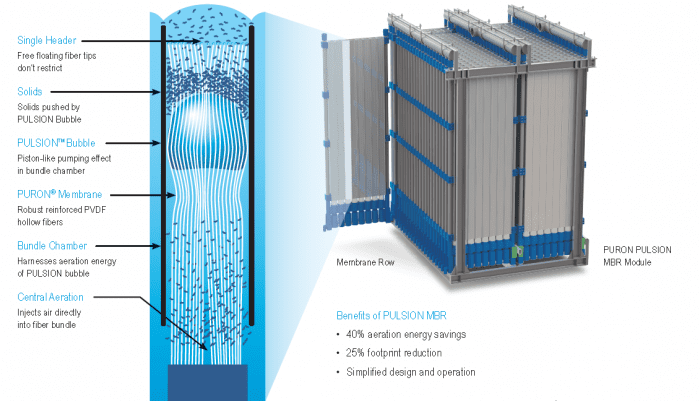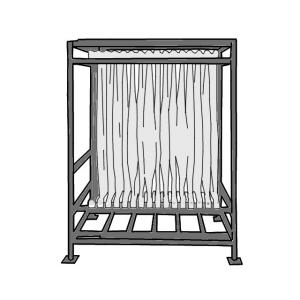Membrane Bioreactor Systems: A Key Technology for Water Reuse and Recycling
Membrane Bioreactor Systems: A Key Technology for Water Reuse and Recycling
Blog Article
How Membrane Bioreactors Are Reinventing Water Purification Systems
The introduction of membrane layer bioreactors (MBRs) stands for a substantial innovation in the area of water filtration, merging biological treatment processes with advanced membrane filtration technologies. As international water shortage increases, the function of MBRs in assisting in drinkable water reuse and sustainable water management becomes increasingly crucial.
Summary of Membrane Bioreactors
Membrane layer bioreactors (MBRs) represent a substantial innovation in water filtration innovation, as they integrate biological therapy processes with membrane layer purification. This combination improves the efficiency of wastewater therapy by making use of microbes to break down organic pollutants while simultaneously using semi-permeable membrane layers to separate treated water from put on hold microorganisms and solids.
The MBR system generally contains an organic activator where the microbial population metabolizes impurities, complied with by a membrane purification system that retains biomass and allows just clean water to travel through. This dual capability leads to higher effluent top quality contrasted to conventional treatment methods. MBRs can be operated in both batch and continuous circulation modes, using versatility in style and application.
They likewise allow the recuperation of water for reuse, thus contributing to water sustainability efforts. Generally, MBRs are at the forefront of enhancing water treatment effectiveness and top quality, showcasing the capacity for ingenious solutions in environmental management.
Advantages of MBR Innovation
The combination of organic treatment with membrane filtration offers various advantages for water purification procedures. Among the primary benefits of Membrane layer Bioreactor (MBR) technology is its ability to effectively eliminate both natural and not natural pollutants, causing top notch effluent. The membrane layers act as a physical barrier, preventing suspended solids and virus from travelling through, which boosts the total safety and security and integrity of cured water.
Furthermore, MBR systems need a smaller impact compared to conventional therapy techniques, enabling much more efficient area utilization. This small layout is especially helpful in metropolitan setups where land is limited. MBRs also show functional flexibility, accommodating varying influent high qualities and flow prices without considerable performance destruction.
Moreover, the procedure supplies enhanced nutrient elimination abilities, particularly for nitrogen and phosphorus, which are critical for protecting against eutrophication in receiving waters. The lowered sludge manufacturing related to MBR modern technology likewise translates to reduce disposal prices, making it a cost-efficient option over time - Membrane Bioreactor. On the whole, the advantages of MBR modern technology position it as a leading choice for sustainable and cutting-edge water purification systems, attending to both ecological and economic worries
Applications in Water Purification
Applications of Membrane Bioreactor (MBR) modern technology in water purification are impactful and diverse, attending to different therapy needs throughout numerous fields. MBRs properly combine organic therapy processes with membrane filtering, making them excellent for local wastewater therapy, industrial effluent administration, and also safe and clean water reuse initiatives.
In municipal settings, MBRs are increasingly utilized to improve the high quality of dealt with wastewater, allowing for conformity with rigid discharge laws and helping with the recycling of water for irrigation and non-potable usages. Their compact design also makes them suitable for urban environments where area is restricted.
Industrially, MBR innovation is Extra resources used to treat process water and wastewater, especially in industries such as food and drink, drugs, and fabrics. By properly getting rid of impurities and put on hold solids, MBRs assist markets decrease ecological influences while recuperating useful resources from wastewater streams.
Furthermore, MBRs are getting grip in decentralized water therapy applications, where small-scale systems can be deployed in remote locations or establishing regions. This versatility enables neighborhoods to accomplish lasting water management options, boosting accessibility to clean water while decreasing reliance on typical treatment approaches.
Situation Studies and Success Stories

In another instance, a fabric production facility in Bangladesh took on MBR modern technology to resolve its wastewater difficulties. The system lowered chemical oxygen demand (COD) levels from 1,200 mg/L to less than 100 mg/L, thus meeting regulative standards and substantially reducing environmental effect.
The College of Cape Community's MBR installation has actually verified efficient in dealing with greywater for non-potable reuse on school. This job not only conserves drinkable water however also functions as an educational model for lasting practices.
In addition, a seafood processing plant in Norway used MBR modern technology to deal with effluents having high degrees of natural matter, accomplishing over 90% toxin elimination. These study underscore MBR modern technology's flexibility and its vital function in enhancing water high quality throughout varied applications.
Future of Water Therapy Solutions
As international water deficiency and pollution difficulties heighten, cutting-edge water treatment solutions are coming to be increasingly crucial to make sure sustainable access to clean water. The future of water treatment hinges on the assimilation of advanced technologies that boost the performance and efficiency of filtration processes. Membrane layer bioreactors (MBRs) are at the leading edge of this advancement, incorporating more tips here biological treatment with membrane layer purification to generate high-quality effluent suitable for different applications.

Emerging trends such as source recovery from wastewater, consisting of nutrients and energy, will certainly additionally transform treatment centers into environmentally friendly hubs. Additionally, advancements in nanotechnology and membrane materials guarantee enhanced efficiency and long life of filtering systems.

Conclusion
Their duty in drinkable water reuse and sustainable water monitoring highlights their value in addressing global water shortage challenges. Proceeded study and advancement will even more enhance the efficiency and adoption of MBR innovation, guaranteeing a resistant future for water treatment services.
The development of membrane layer bioreactors (MBRs) represents a significant innovation in the field of water purification, merging organic therapy procedures with cutting-edge membrane layer filtration modern technologies. As international water deficiency increases, the function of MBRs in assisting in drinkable water reuse and sustainable water monitoring becomes progressively essential. They additionally allow the recovery of water for reuse, hence adding to water sustainability campaigns.As international water deficiency and air pollution challenges heighten, cutting-edge water therapy remedies are becoming increasingly vital to make sure sustainable access to clean water. Their duty in safe and clean water reuse and lasting water management highlights their importance in resolving international water shortage difficulties.
Report this page